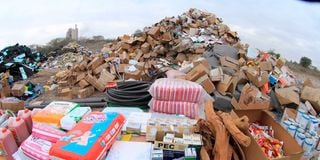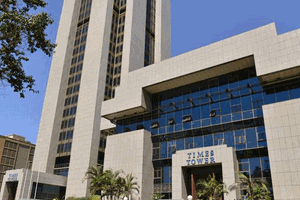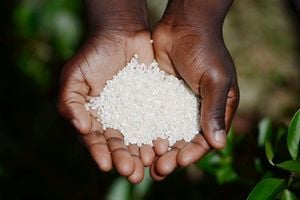
Counterfeit goods continue to rob Kenya of billions of shillings in taxes every year.
Kenya loses at least Sh40.41 billion in taxes annually due to proliferation of counterfeit goods in the country, according to a report from the Office of the Auditor-General, which attributes the practice to corruption and inefficiencies at the Anti-Counterfeit Authority (ACA).
The performance audit on enforcement of anti-counterfeit regulations by ACA, before parliament, indicates that a research by the authority, fingered China as the largest exporter of counterfeits to Kenya involving fast moving goods such as phones, sound equipment, cables, clothing and automobile spare parts among others.
This comes even as fears teem that increased counterfeit products in the market harm both humans and the environment.
Other than lost revenue, local manufacturers and Intellectual Property Rights (IPR) owners lose over Sh6.52 billion for a practice the auditors say has been aided by weak enforcement of the law and regulations by ACA, its staff integrity issues and the authority’s lack of physical verification of destroyed goods.
“Counterfeit trade causes economic sabotage as the government and IPR owners lose revenue, unfair competition from counterfeit products, tax avoidance, illicit imports and dumping that leads to a reduction in market share,” says the audit.
The audit covered Nairobi, Mombasa, Kisumu and Eldoret regional offices as well as Namanga and Busia border points.
Lost revenue is enough to fund construction of enough Junior Secondary Schools (JSS) classes, hiring of JSS teachers, and construction of standard boreholes in drought stricken areas as well as finance the Ethics and Anti-Corruption Commission (EACC) for more than 10 years.
The EACC budget for the 2023/24 financial year is Sh3.9 billion.
The audit goes on to state that the continuous increase in counterfeit and unlicensed products such as alcoholic and illicit brews in circulation in Kenya is denying the country over Sh30 billion in annual revenue.
This is notwithstanding that consumption of illicit brews, has led to loss of many lives.
A report on economic impact of counterfeiting by the Organisation for Economic Co-operation and Development (OECD), the audit says, shows that counterfeit products are made to closely imitate appearance of original product so as to dupe consumers.
This includes the unauthorised production and distribution of products that are protected by IPRs such as copyrights, trademarks and trade-names.
The audit cites software, music recordings, motion pictures, luxury goods, fashion clothes, sportswear, perfumes, toys, motor vehicle spare-parts and accessories, and pharmaceuticals as the leading industries that have been affected.
However, Kenya is not an exception as global statistics indicate that prevalence of counterfeiting is on the rise in the world and affects even developed countries, as per global statistics.
For instance, the global impact of counterfeiting as of 2012 was estimated at $650 billion.
The audit also borrows from a study by the Kenya Association of Manufacturers (KAM), which estimated that the East African region loses about $500 million annually to counterfeiting while the companies in the same region have lost 70 per cent of market share to counterfeits.
Due to Kenya’s large geographical coverage, there are many entry and exit points that make it easy to smuggle goods into the country either with the help of ACA officers or discretely.
This has been worsened by the fact that ACA has “limited number of staff not able to handle the verification of goods at these border points.”
Although the law provides that ACA can appoint and train inspectors from relevant stakeholders in the fight against counterfeit trade, “this has not been done and there is limited collaboration and coordination between ACA and its various stakeholders.”
Staff integrity issues have also not helped the anti-counterfeit war as the audit’s documentary review revealed that 12 workers have faced disciplinary cases “in line with matters bordering on corruption and various allegations made by stakeholders.”
“It was also reported that a number of officers received show cause letters and upon their response, no further action or record to indicate any further action was taken by the management,” the audit says.
The audit established that there have been instances of officers using unserialised inventory forms during raids and seizures as well as signing these forms using signatures different from official ones.
Similarly, officers release goods that have been confirmed counterfeit and their destruction fees paid.
For instance Kisumu and Mombasa offices have released goods without communication and approval of the Alternative Dispute Resolution Committee (ADRC).
It was also noted that there were no correspondences in the files between the officers and the IPR owners to show that they were involved in the ADR process as per the enforcement procedures.
The Anti-Counterfeit Act provides that goods that have been seized shall be stored and kept in safe custody at a counterfeit goods depot until the person in charge of the depot is ordered by a court to return, release, destroy or otherwise dispose of those goods as specified in the order.
Such goods shall be destroyed at the expense of the local manufacturer or importer based on the environmental considerations and the capacity of the country to destroy the goods or shall be reshipped.
The high cost associated with filing complaints and the failure of the ACA to act promptly when counterfeit cases are reported, affected the war against counterfeits. Further, the low number of ACA prosecutors has affected the efficiency in handling of cases and thereby causing delays in prosecution of suspects.
The fact that ACA has only prosecuted four cases with a backlog of over 200 cases still pending, has worsened the situation.
This is based on the fact that there are gazetted prosecutors who are not involved in prosecution hence overloading their active colleagues.











